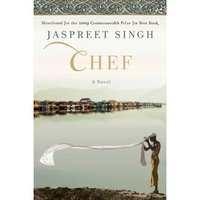Familial love, unrequited love and food love are all in 'Chef'

In the opening pages Kip reflects, "Why did I allow my life to take a wrong turn?" The story flashbacks to his early military days as an apprentice for Chef and the paths each of their lives took.
The majority of the novel takes place in Kashmir in the 1980s, as India and Pakistan fight for the territory. Kip's father, a respected military hero, dies during the Siachen Glacier conflict. Kip hastily joins his father's regiment after learning of his death, in spite of the fact that he never wanted to be in the army.
As a military cook, Kip is sent to the area to work in the house of General Sahib. During this time Chef teaches him to regard food in a different way (a tortellini is a woman's belly button; there is poetry in the peeling of an onion).
As the story is written, Kip is primarily a witness as he proceeds in military ranks - a witness to the life of General Sahib and his family, to Chef's knowledge and respect of food ("Before cutting a tomato, give it the reverence it deserves and ask: Tomato what would you like to become?") and to the destructiveness of war.
Initially, Kip sees General Sahib primarily in his own home with his daughter Rubiya. Over time conflicting images present themselves -- a man distressed at the illness of a beloved pet is very different from the military general reviewing the fate of individuals who are perceived as a threat. Mixed in with these conflicting images is also the role General Sahib takes on for Kip. The General knew Kip's father well and had great respect for him; this is one reason he wants to aid Kip.
Chef also takes on a paternal role for Kip; he tries to help Kip move beyond his father's death ("Let the dead rest.... Your father has become one with the glacier, Kip.") Chef also repeatedly advises, believing it would be to Kip's benefit, "Get yourself a woman."
Chef eventually is transferred to the Siachen Glacier conflict, where the inhuman conditions wear on him; he deteriorates physically and mentally. Kip acquires Chef's journal, after Chef has attempted suicide, in order to understand what occurred on the glacier that has changed his mentor so.
The journal is filled with his opinions on food with an occasional dirty picture (always also food related). Siachen Glacier is offensive to Chef on every level - he experiences vertigo when getting to the station, only canned food is eaten once there, and the danger imposed by the severe cold makes him question why soldiers are located there in the first place.
As Kip absorbs, second-hand, the Chef's pain he soon witnesses that of another. A Pakistani woman named Irem is taken into custody by the Indian army. Kip's concern for her grows and remains with him, even long after he has lost track of her.
All those who Kip encounters are changed irrevocably by the war, in unpredictable ways: General Sahib, Chef, and Irem. Kip witnesses torture, loss, simple confusion, prejudice, and his own moral standing in the quagmire shifts over time.
I have given away more plot points than I would like when writing this review, but make no mistake, there are additional stories in this novel of overlapping plots.
While food and recipes are an integral part of the novel, "Chef" is more about the variations of love that can be both transpired and destroyed by war.

